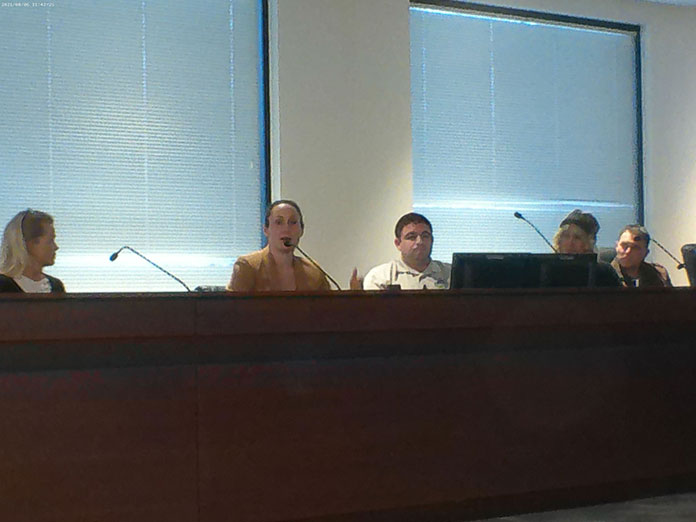
HOWELL – As part of their continuing implementation of the township’s Master Plan, members of the Farmers Advisory Committee (FAC) hosted an open public forum at the town hall on March 23 to discuss the 2023 Farmland Preservation Plan (FPP).
The meeting was chaired by the township’s Director of Community Development, Matt Howard, with advisory input from Christine Bell of the Leon S. Avakian engineering firm.
“We’re here now to present the preliminary draft of the comprehensive permanent preservation plan,” Howard stated at the onset of the meeting. “The Township has a Master Plan and it contains several elements, everything ranging from land use, circulation, open space and recreation, [and] environmental resource. One of those is the comprehensive Farmland Preservation Plan.”
The plan, which is currently in the drafting stage, is available as a public document on the township’s website, along with a color-coded map of farms within the town borders of Howell.
“We have to do an update every ten years and we are just about past that date,” said Howard. “So that’s why we’re looking to do an update now.”
To continue to be eligible for state funds, the township must renew and address its open space and preservation plans, and the public forum meeting was one way to address the concerns and questions of the residents of Howell Township. Advanced notice had been posted on the township’s website on March 1, providing information about the publicly attended meeting.
“Howell Township’s elected officials and committee members are deeply committed to preserving our natural resources, open space and agricultural foundation,” the notice read. “The plan will identify and list potential properties that may be eligible for grant funding on a state, county and local level for farmland preservation.”
The township’s Farmland Preservation Plan, in its draft form, currently runs 107 pages. As she went through the plan, which was projected on the screen adjacent to the dais, Bell enumerated the numerous aspects of the comprehensive plan, including the newer elements which had been incorporated into the latest edition.
“New to this plan, but not new within the last few years in the area, we talked about COVID-19 and how there’s been an increase in demand for warehousing around and how that can impact farmland,” said Bell. Warehouse proliferation has been an increasingly controversial topic in New Jersey as well as the rest of the United States, and proposals presented to the Planning Board by developers are closely scrutinized by the Howell FAC.
The FPP addresses agricultural support services and related industries, land use planning, in addition to development pressures, sewers, public water supply services and expanded farmland preservation funding. Both the Howell FAC and the Preservation Task Force function as the de facto monitoring system presently in place to ensure that current preserved farmland remains as such, and as Bell explained during the meeting, the township’s comprehensive plan also lays out the short- and long-term goals to purchase sites for preservation.
As Bell’s presentation concluded, the proceedings were then opened to public comment, and while there were a number of individuals who did ask questions, many chose to hold their questions until the end to approach Howard and Bell privately, as well as members of the Howell FAC, once the meeting had ended.
One of the major issues with farmland preservation is simple economics. Without state funding, the township is left to allocate funds from the municipal budget in order to secure the lands to be purchased for preservation.

“Unfortunately, as we all know, in this market property’s expensive,” Howard explained. “Property with development potential is significantly expensive, so the township going at it themselves to preserve large tracts of land is very difficult, because you’re paying top dollar.”
The project also considered other factors in identifying potential properties, including size (parcels need to be over ten acres), as well as soil quality and location. The list in its finalized form identified those farms that appeared to be the most feasible targets, as well as those that had the potential to be preserved.
“This list was put together with the help of the Farmers Advisory Committee,” Howard explained. “We spent more than a couple of nights, probably, looking at aerial maps, looking at wetlands mapping, and all kinds of different factors to come up with this list.”
With the list in place, the town is still inviting any commentary from the public before the plan moves forward through the steps for Planning Board approval.
“After this meeting, we’re going to notify existing present farms, the existing target list, and the potential target list just to say, ‘this is what we’re talking about, and if you have any comment or interest, just come forward’.”
Once adopted into the town’s Master Plan, officials will await funding to become available to move on approaching the current owners about having their properties purchased and converted into preserved farms. But preserving farms, as well as open space, is seen not only as a quality of life issue to the residents of Howell.
“It’s more than just farm preservation,” explained Leslie Chaillet, a member of the Farmers Advisory Council. “Take a look at our township flag, that was designed and sewn by hand in 1976. The flag depicts so much of what Howell history is about from the plow, to the forests, to the crops, each telling a story of why we need to continue to preserve our farms and support our local farmers who work so hard to maintain it.”
The next stage of the process, now that the public forum has been held, is to move the draft version of the FPP to the Planning Board subcommittee. The subcommittee will fine-tune and augment the document as currently constituted before it moves to the Planning Board proper for a full vote and eventual adoption into township policy.






